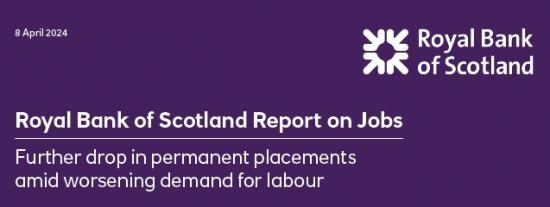RBS Report - Decline in staff appointments across Scotland
9th April 2024

The latest Royal Bank of Scotland Report on Jobs survey signalled a fresh decline in permanent staff appointments across Scotland during December. The pace of reduction was the strongest since April, as growing economic uncertainty weighed on hiring decisions and discouraged workers from seeking new roles.
However, temp billings rose further in December, highlighting a preference for temporary staff amongst employers.
Candidate shortages meanwhile continued to push up starting salaries, though the rate of inflation eased notably from November. Temp wage growth also softened at the end of the year.
Finally, overall demand for staff weakened further, with both permanent and temp vacancies declining markedly in December.
Renewed fall in permanent placements
Scottish recruitment firms recorded a fresh fall in permanent staff appointments during December, with declines now noted in four of the last five survey periods. The rate of decrease was the most pronounced since April and sharp. The reduction was linked by recruiters to heightened levels of economic uncertainty, which dampened employers' and workers' intentions to hire or seek out new roles. Permanent staff appointments fell at a steeper rate across Scotland than that seen across the UK as a whole. December data pointed to a second consecutive monthly rise in billings received from the employment of temporary staff across Scotland. The rate of expansion, though mild, quickened from November. The latest rise was reportedly supported by increased demand for contract workers. Meanwhile, recruiters across the UK recorded a further fall in temp billings during December.
Availability of permanent staff declines
Permanent staff availability across Scotland fell in December, thereby stretching the current period of decrease to 35 months. The pace of decline remained sharp despite easing to a three-month low. According to recruiters, fewer workers were willing to risk a job move in the current economic climate. Royal Bank of Scotland has paved the way in banking ever since it was established in 1727. From the world's first overdraft, and the first house purchase loan by a UK bank, to the first fully-fledged internet banking service and mobile banking app the bank has a history of making life easier for its customers. The bank has commitment to retain its close connections with the Scottish communities it serves. The reduction in the number of workers seeking permanent positions across Scotland contrasted with the marked upturn in permanent staff availability at the UK level. A third consecutive monthly rise in temp candidate supply was recorded across Scotland in December. The respective seasonally adjusted index ticked up further from September to signal a sharp rise in temp staff supply overall. Recruiters often attributed the upturn to redundancies and the non-renewal of contracts. However, growth of temp staff supply across the UK as a whole continued to outpace that seen in Scotland.
Permanent salary inflation eases notably
Salaries awarded to newly-placed permanent staff increased sharply across Scotland in December. The rise in salaries was said to have been primarily driven by candidate shortages. However, the rate of inflation moderated to a seven-month low and was weaker than both the historical and UK-wide averages. Latest data signalled a further rise in temporary wages across Scotland at the end of 2023. While the pace of increase eased for the second month running, it remained sharp overall and broadly in line with the long-run average. The latest upturn in temp pay was largely linked to the growing cost of living. While the rate of temp wage growth quickened across the UK as a whole, it remained weaker than that observed in Scotland.
Steeper drop in permanent vacancies
Scottish recruiters registered a marked fall in permanent vacancies during December. Moreover, the rate of contraction was the strongest since November 2020. Demand for permanent staff also weakened at the UK level, but only marginally. Across the eight monitored sectors, Blue Collar and Engineering & Construction recorded the joint-fastest falls in permanent vacancies. Meanwhile, Nursing/Medical/Care defied the broader trend by reporting an upturn in permanent staff demand. As has been the case since August, Scottish recruiters noted a fall in temp vacancies in December. Moreover, the rate of contraction was the most marked in three-and-a-half years. Meanwhile, demand for temp staff across the UK as a whole rose slightly. Engineering & Construction noted the quickest decline in short-term vacancies, followed by Executive & Professional. Royal Bank of Scotland has paved the way in banking ever since it was established in 1727. From the world's first overdraft, and the first house purchase loan by a UK bank, to the first fully-fledged internet banking service and mobile banking app the bank has a history of making life easier for its customers. The bank has commitment to retain its close connections with the Scottish communities it serves.
Sebastian Burnside, Chief Economist at Royal Bank of Scotland, commented, "The Report on Jobs survey highlights that 2023 has generally been a weak year for the Scottish labour market, with permanent staff appointments rising in only three months of the year. Moreover, December recorded the most marked decline in permanent placements since April and one that was sharp overall, as employers were hesitant to commit to new hires amid lingering economic uncertainty - a theme also observed at the UK level. In contrast, temp billings continued to increase at the end of the year as businesses opted for more flexible employment arrangements.
"The subdued economic environment and signs of further declines in vacancies suggest that hiring activity will remain weak as we head into 2024. However, softening demand conditions have led to slower rates of pay growth, especially for permanent starters' salaries, helping to ease the pressure on employer’s budgets."
To read the full report go HERE
